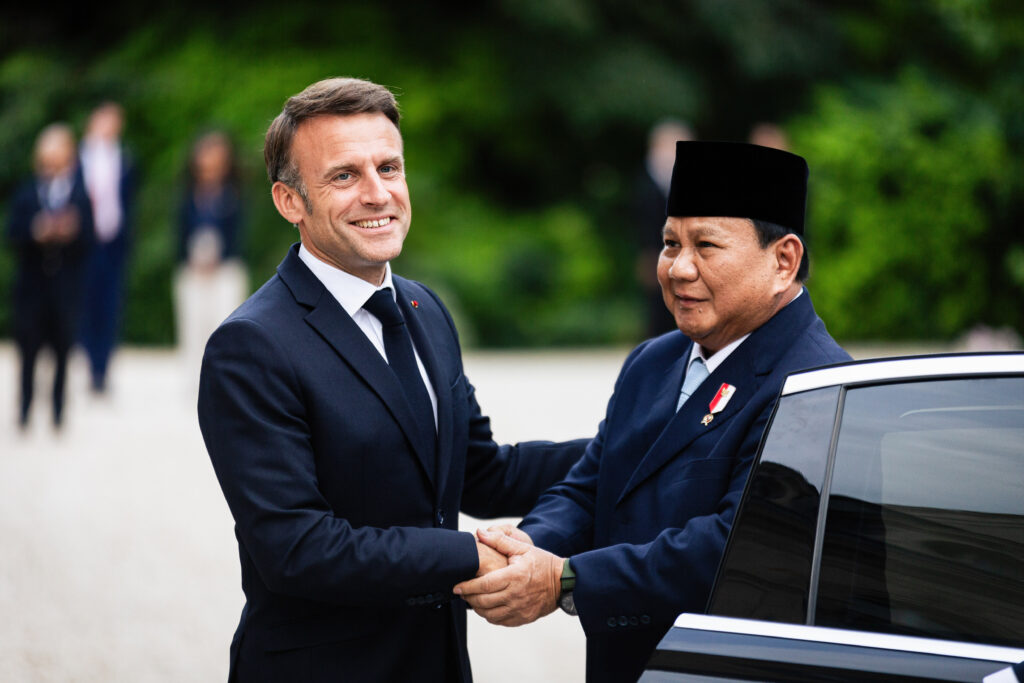Interviews / Asia-Pacific
28 May 2025
Indonesia, a Strategic Partner for France in the Indo-Pacific?

On 28–29 May 2025, French President Emmanuel Macron will pay a state visit to Indonesia. This trip forms part of a six-day tour of Southeast Asia, during which Paris seeks to reaffirm its commitment to the Indo-Pacific as a “balancing power” between China and the United States. To what extent can Indonesia be seen as a key strategic partner for France in the region? What kind of relationship does Jakarta maintain with Paris and, more broadly, with Brussels? What are the key stakes of this visit? Coline Laroche, Analyst at IRIS and specialist on Indonesia within the Asia-Pacific Programme, provides an in-depth analysis.
What is the current state of France–Indonesia relations? What are the main issues at stake in this state visit?
Marking 75 years of diplomatic ties, President Macron’s visit to Indonesia is part of a broader Southeast Asia tour (Vietnam, Indonesia, Singapore) designed to bolster France’s Indo-Pacific strategy. Although Macron travelled to Indonesia for the G20 Summit in 2022, this is the first official presidential state visit to the archipelago since Nicolas Sarkozy in 2011, who then came to support the signing of the France-Indonesia strategic partnership on 1 July 2011.
The visit is intended to revitalise bilateral ties, especially in the geopolitical, economic, cultural, and above all, security domains.
France and Indonesia have stepped up their defence cooperation in recent years amid growing tensions in the Asia-Pacific. On one hand, Paris has been seeking new partners and opportunities for arms exports following the cancellation of its submarine deal with Australia in 2021 and the subsequent creation of the AUKUS alliance (Australia, UK, USA). On the other hand, Prabowo Subianto, Indonesia’s president and former Defence Minister (2019–2024), has prioritised military modernisation, calling for the renewal of ageing equipment and a diversification of suppliers. In this context, the two countries signed a defence cooperation agreement in August 2021. This led to Indonesia ordering 42 Rafale jets worth $8.1 billion in February 2022, requesting two Scorpène Evolved submarines from Naval Group and PT PAL in March 2024, and establishing a joint venture between Thales and PT LEN in May 2024 to boost Indonesia’s defence capabilities. The current state visit could pave the way for further negotiations on military equipment.
Beyond contracts, military cooperation has continued through joint exercises, such as the La Pérouse 25 naval drills held in January 2025. The visit by France’s Minister of the Armed Forces, Sébastien Lecornu, to Jakarta on 31 January also reaffirmed shared commitments on operational, capability-building, industrial, and training cooperation.
This visit also presents an opportunity to strengthen economic relations. Macron arrives at a time when Jakarta is actively developing its infrastructure and seeking expertise to achieve its goal of becoming a developed economy by 2045, all while diversifying its trade partnerships to reduce dependency on China and shield itself from U.S. tariffs under Donald Trump. France ranked as the fourth-largest European investor in Indonesia in 2024 (after the Netherlands, UK, and Germany), with $328 million in investments. Around 200 French companies operate in Indonesia, employing approximately 54,000 people. The two leaders are expected to expand cooperation in critical raw materials, energy transition, digital infrastructure, urban transport, and agriculture, particularly to support the “Makan Bergizi Gratis” programme introduced by Prabowo, which aims to provide free, nutritious school meals.
Geopolitically, France and Indonesia share common views on several key issues, and multiple topics are on the agenda. Promoting global peace and security will be a central theme—particularly with regard to the wars in Ukraine and the Middle East. Macron is seeking Indonesian support for the Gaza Conference, which France is co-chairing with Saudi Arabia in June 2025, in a bid to revive the “two-state solution”. Such support appears plausible, especially following Macron’s recent rhetorical shift on the conflict. Indonesia, the world’s most populous Muslim-majority nation, deeply invested in the Palestinian cause and lacking diplomatic ties with Israel, has shown interest in playing a more active role in resolving the Gaza crisis. Macron’s visit also underlines France’s broader Indo-Pacific ambitions. Regional cooperation will be on the agenda, including a meeting with ASEAN Secretary-General Kao Kim Hourn.
In parallel, France and Indonesia are expected to reinforce their cultural and scientific ties, and expand academic exchanges.
How central is Indonesia to France’s Indo-Pacific strategy?
France was the first European country to adopt an Indo-Pacific strategy in 2019, initially centred on defence but broadened in 2022 to include diplomatic and economic dimensions. The region is strategically vital to France, both because of its overseas territories (Mayotte, Réunion, New Caledonia, Wallis and Futuna, and French Polynesia) and because of its economic and geopolitical significance. The Indo-Pacific is rich in natural resources—fisheries, minerals, hydrocarbons—and is a critical maritime trade hub. It is also the stage for mounting competition between the United States and China. France’s approach has been to position itself as a “third voice” promoting multilateralism, stability, and strategic autonomy, using its global diplomatic influence and UN Security Council seat. Its strategy rests on a network of partners, including QUAD members India, Japan, the United States, and, though more cautiously since the submarine dispute, Australia, alongside key regional players like Indonesia and Singapore.
In this framework, Indonesia stands out as a strategic partner. With over 17,000 islands and 285 million inhabitants, and located at the junction of the Indian and Pacific Oceans, Indonesia plays a critical role in regional security and trade. Its large exclusive economic zone (more than six million km²) and control of access to the Strait of Malacca, a key maritime chokepoint linking Europe and the Middle East to Asia, make it a heavyweight in Indo-Pacific geopolitics. As ASEAN’s largest country and an active promoter of multilateralism, Indonesia is also an essential interlocutor for France. Its international profile has grown with its membership in the G20 and more recently in BRICS+, strengthening its influence on global affairs, a valuable asset for France’s diplomacy.
France and Indonesia also cooperate through various regional initiatives and organisations, including the Indian Ocean Rim Association (IORA), the Western Pacific Naval Symposium, and the Indo-Pacific Oceans Initiative (IPOI), as well as the Heads of Asian Coast Guard Agencies Meeting (HACGAM).
Taken together, these factors highlight Indonesia’s essential role in France’s Indo-Pacific vision, and more broadly, that of the European Union. President Macron is clearly aware of this strategic importance: in a symbolic gesture echoing the 2023 invitation extended to Indian Prime Minister Narendra Modi, he has invited President Prabowo Subianto to attend France’s Bastille Day celebrations as guest of honour.
Through this Southeast Asia tour, Macron is also indirectly reinforcing the EU’s presence in the region. This raises a broader question: What is the current state of relations between Indonesia and the European Union?
While ties between Paris and Jakarta have deepened in recent years, relations between Indonesia and the EU may face more friction under President Prabowo Subianto.
After the fall of Suharto’s regime, EU–Indonesia relations were primarily built on economic cooperation, support for democratic governance, human rights, humanitarian assistance, and development aid. The EU notably supported the Aceh peace process in 2005. These efforts were formalised through the 2009 Partnership and Cooperation Agreement, which entered into force in 2014. Under President Joko Widodo (2014–2024), EU–Indonesia ties strengthened further, especially in trade, with the EU becoming Indonesia’s fifth-largest trading partner. Widodo’s moderate profile in the West also facilitated political dialogue and cooperation within the Indo-Pacific framework.
However, President Prabowo has adopted a more assertive, nationalist tone. While negotiations on the Indonesia–EU Comprehensive Economic Partnership Agreement are ongoing, tensions persist. Prabowo has criticised what he calls Europe’s “double standards”, particularly targeting the EU Deforestation Regulation (EUDR) adopted in May 2023, which restricts imports of commodities like palm oil, rubber, coffee, and cocoa. He argues this measure ignores Europe’s historical responsibility for deforestation during the colonial era. He has also challenged the EU’s inconsistent positions on global crises, notably accusing it of applying a “double standard” in its responses to the conflicts in Ukraine and Gaza.
In this context, Macron’s state visit is especially significant in laying the groundwork for a strategic, pragmatic partnership between the EU and Indonesia’s new administration.

